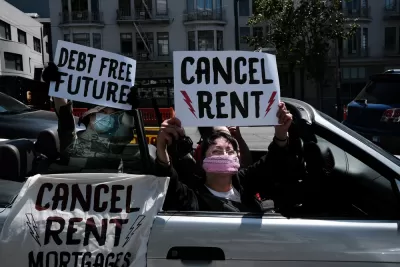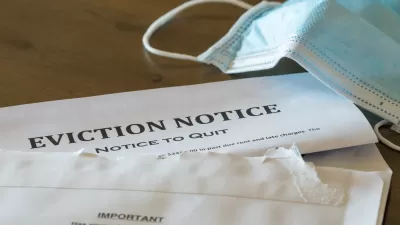Because many rent relief programs prioritize tenants actively facing eviction, some Ohio landlords are using eviction to speed up the process.

In spite of federal eviction moratoriums, reports Kriston Capps, "Columbus-area landlords have filed nearly 17,000 evictions in the 16 months since the start of the pandemic, according to Princeton University’s Eviction Lab," with some happening for a surprising reason: "[s]ome landlords are taking their tenants to court in order to speed the delivery of federal rent relief."
"For the City of Columbus and Franklin County, rent relief funds are distributed by IMPACT Community Action, a nonprofit organization (one that was operating out of the convention center for the last year). A memo from the Willis Law Firm, dated March 11 and available on the Columbus Apartment Association website, advises landlords who are eager to get a federal bailout for renters in arrears to move immediately to evict."
The memo notes, "IMPACT has typically been slow when it comes to paying out rental assistance before an eviction is filed. We have found that the number 1 way and the quickest way to get assistance for a tenant is to actually file an eviction because the tenant can meet face-to-face with IMPACT at court." Meanwhile, "[s]ome aid programs under the CARES Act required tenants to have an eviction notice in order to get rental assistance," and federal help has been slow to arrive: "Just 7% of the $565 million designated for Ohio in the first round of emergency rental assistance reached Ohio renters by the end of June, according to the latest figures from the U.S. Treasury Department."
According to tenant advocates,"this legal strategy lines up with a longstanding practice by large landlords to rely on courts to settle their disputes." Now, "[w]ith another eight weeks added to the eviction moratorium, there is more time to get the money out to tenants in need.," but "even if the landlord is made whole, some damage is done, since tenants bear the mark of an eviction filing on their rental history even when the case is dismissed or if the tenant wins the case."
FULL STORY: To Get Federal Rent Relief From Tenants, Landlords File Evictions Against Them

Planetizen Federal Action Tracker
A weekly monitor of how Trump’s orders and actions are impacting planners and planning in America.

Maui's Vacation Rental Debate Turns Ugly
Verbal attacks, misinformation campaigns and fistfights plague a high-stakes debate to convert thousands of vacation rentals into long-term housing.

Cuomo Is the Candidate of Both NIMBYs and Developers. What Gives?
In the New York City mayoral race, odd bedfellows align to preserve the housing status quo.

The Subversive Car-Free Guide to Trump's Great American Road Trip
Car-free ways to access Chicagoland’s best tourist attractions.

San Antonio and Austin are Fusing Into one Massive Megaregion
The region spanning the two central Texas cities is growing fast, posing challenges for local infrastructure and water supplies.

Charlottesville Temporarily Has No Zoning Code
A judge ordered the Virginia city to throw out its newly revised zoning code, leaving permitting for new development in legal limbo.
Urban Design for Planners 1: Software Tools
This six-course series explores essential urban design concepts using open source software and equips planners with the tools they need to participate fully in the urban design process.
Planning for Universal Design
Learn the tools for implementing Universal Design in planning regulations.
Heyer Gruel & Associates PA
JM Goldson LLC
Custer County Colorado
City of Camden Redevelopment Agency
City of Astoria
Transportation Research & Education Center (TREC) at Portland State University
Jefferson Parish Government
Camden Redevelopment Agency
City of Claremont





























